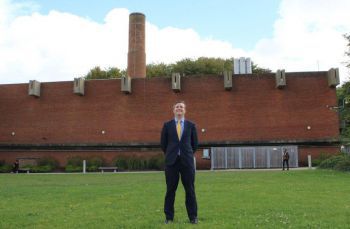Improvements to green energy bring further reductions in carbon emissions
Sussex is proving that it pays to be green as it continues to make significant reductions in its energy consumption and to reduce its carbon footprint.
 Matthew Arnold, Energy and Environmental Manager for SEF, is pictured here outside the campus Boiler House. He welcomes the ongoing reductions in its energy consumption at Sussex
Matthew Arnold, Energy and Environmental Manager for SEF, is pictured here outside the campus Boiler House. He welcomes the ongoing reductions in its energy consumption at Sussex
The University’s carbon emissions are measured through a government scheme to improve energy efficiency in large organisations including universities
Sussex has reduced its CO2 emissions as calculated through this scheme – known as the Carbon Reduction Commitment Energy Efficiency Scheme (CRC) - by over 1,900 tonnes against 2014-15.
It represents an 8.9% reduction on last year’s reported figure and has not only saved money on utility bills but has also brought a further £30,000 of carbon tax savings.
Matthew Arnold, Energy and Environmental Manager for SEF, says: “This reduction is in spite of an increasing number of students, a slightly colder year than last year, and major campus refurbishment works.”
The carbon reduction is directly linked to ongoing improvements by Sussex Estates and Facilities (SEF) to the performance and operation of the Combined Heat and Power (CHP) unit that produces power and heating for the campus.
Installed in the Boiler House in 2007, the CHP supplies one-third of the campus electricity demand from Monday to Friday and almost half every weekend.
Significant energy savings have been achieved with a number of measures to improve the efficiency and output of the CHP, such as improvements to engine performance and an increase in operational hours.
Further carbon savings have also been made through improvements to the control of boilers and air-conditioning equipment on campus, as well as changes to carbon-conversion figures.
SEF and the University are not complacent, however, and will be progressing with ‘big ticket’ projects over the next few months, to ensure continued improvement.
For example, a new metering project in progress will enable clearer information about energy consumption at a building and service level. Meters are already capturing data every 30 minutes about energy usage and generation from the campus boilers and CHP, as well as information about the heating use in each building on campus; previously this was done monthly.
Matthew explains: “We are committed to reducing the University’s environmental impact and we aim to achieve required absolute carbon reductions by 2020.
“Every pound saved from the utility bill is a pound available for the University’s needs.”
